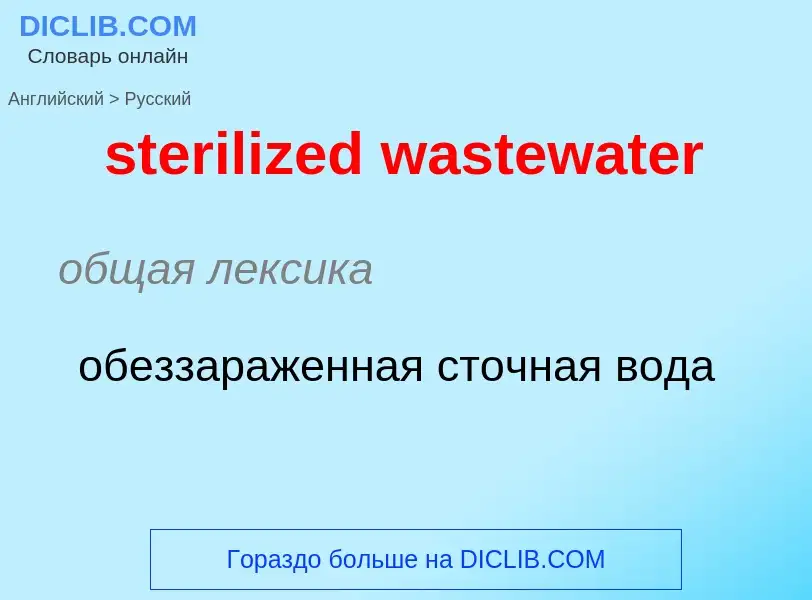Traducción y análisis de palabras por inteligencia artificial ChatGPT
En esta página puede obtener un análisis detallado de una palabra o frase, producido utilizando la mejor tecnología de inteligencia artificial hasta la fecha:
- cómo se usa la palabra
- frecuencia de uso
- se utiliza con más frecuencia en el habla oral o escrita
- opciones de traducción
- ejemplos de uso (varias frases con traducción)
- etimología
sterilized wastewater - traducción al ruso
общая лексика
обеззараженная сточная вода
строительное дело
неочищенная сточная жидкость
неочищенные сточные воды
Definición
Wikipedia
.jpg?width=120)
Wastewater treatment is a process which removes and eliminates contaminants from wastewater and converts this into an effluent that can be returned to the water cycle. Once returned to the water cycle, the effluent creates an acceptable impact on the environment or is reused for various purposes (called water reclamation). The treatment process takes place in a wastewater treatment plant. There are several kinds of wastewater which are treated at the appropriate type of wastewater treatment plant. For domestic wastewater (also called municipal wastewater or sewage), the treatment plant is called a Sewage Treatment. For industrial wastewater, treatment either takes place in a separate Industrial wastewater treatment, or in a sewage treatment plant (usually after some form of pre-treatment). Further types of wastewater treatment plants include Agricultural wastewater treatment and leachate treatment plants.
Processes commonly used in wastewater treatment include phase separation (such as sedimentation), biological and chemical processes (such as oxidation) or polishing. The main by-product from wastewater treatment plants is a type of sludge that is usually treated in the same or another wastewater treatment plant.: Ch.14 Biogas can be another by-product if anaerobic treatment processes are used. Treated wastewater can be reused as reclaimed water. The main purpose of wastewater treatment is for the treated wastewater to be able to be disposed or reused safely. However, before it is treated, the options for disposal or reuse must be considered so the correct treatment process is used on the wastewater.
The term "wastewater treatment" is often used to mean "sewage treatment".

![[[Sewage treatment plant]] (a type of wastewater treatment plant) in [[Cuxhaven]], Germany. [[Sewage treatment plant]] (a type of wastewater treatment plant) in [[Cuxhaven]], Germany.](https://commons.wikimedia.org/wiki/Special:FilePath/2012-05-28 Fotoflug Cuxhaven Wilhelmshaven DSCF9867 (crop).jpg?width=200)
![Aeration tank of an [[activated sludge]] process at the wastewater treatment plant in Dresden-Kaditz, Germany Aeration tank of an [[activated sludge]] process at the wastewater treatment plant in Dresden-Kaditz, Germany](https://commons.wikimedia.org/wiki/Special:FilePath/Belebungsbecken - aeration tank (12359229313).jpg?width=200)
![[[Clarifier]]s are widely used for wastewater treatment. [[Clarifier]]s are widely used for wastewater treatment.](https://commons.wikimedia.org/wiki/Special:FilePath/Bundesarchiv Bild 183-1984-1002-002, Güstrow, Zuckerwerk, Klärwerk.jpg?width=200)

.jpg?width=200)

![Ocean outfall]] pipes in [[Cape May, New Jersey]], United States – pipes exposed after the sand was removed by severe storm Ocean outfall]] pipes in [[Cape May, New Jersey]], United States – pipes exposed after the sand was removed by severe storm](https://commons.wikimedia.org/wiki/Special:FilePath/FEMA - 42863 - Outfall tubes in Ocean City beach.jpg?width=200)
![[[Greywater]] (a component of sewage) in a settling tank [[Greywater]] (a component of sewage) in a settling tank](https://commons.wikimedia.org/wiki/Special:FilePath/Greywater settling tank and grease trap (3109542163).jpg?width=200)
![Pumping station lifting sewage to the treatment plant in [[Bujumbura]], Burundi Pumping station lifting sewage to the treatment plant in [[Bujumbura]], Burundi](https://commons.wikimedia.org/wiki/Special:FilePath/Pumping station lifting the wastewater (6908385151).jpg?width=200)
![Screening of sewage at a sewage treatment plant in [[Bujumbura]], Burundi Screening of sewage at a sewage treatment plant in [[Bujumbura]], Burundi](https://commons.wikimedia.org/wiki/Special:FilePath/Screen (6619766435).jpg?width=200)
![Screening of the sewage with bar screens at a sewage treatment plant to remove larger objects in Norton, [[Zimbabwe]] Screening of the sewage with bar screens at a sewage treatment plant to remove larger objects in Norton, [[Zimbabwe]]](https://commons.wikimedia.org/wiki/Special:FilePath/Screening of the wastewater to remove larger objects. (6845984661).jpg?width=200)
![Lack of maintenance causing sewage to overflow from a manhole into the street of an informal settlement near [[Cape Town]], South Africa Lack of maintenance causing sewage to overflow from a manhole into the street of an informal settlement near [[Cape Town]], South Africa](https://commons.wikimedia.org/wiki/Special:FilePath/Wastewater in street (informal settlement near Cape Town), South Africa (2937833876).jpg?width=200)
